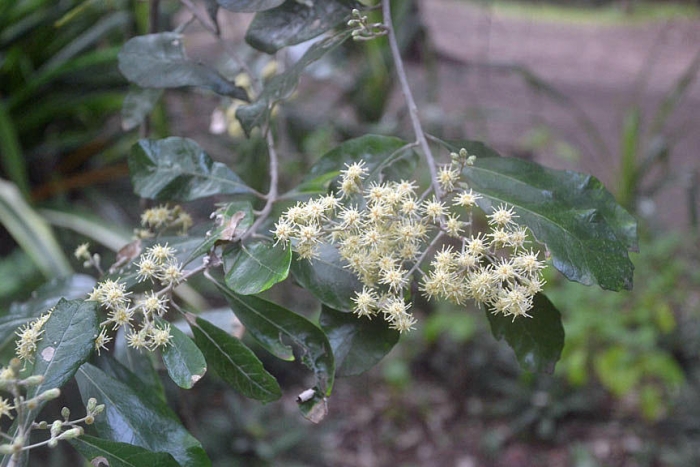Coast Silver Oak
(Brachylaena discolor)
Coast Silver Oak (Brachylaena discolor)
/
/

Caroline Voget
CC BY 4.0
Image By:
Caroline Voget
Recorded By:
Copyright:
CC BY 4.0
Copyright Notice:
Photo by: Caroline Voget | License Type: CC BY 4.0 | License URL: http://creativecommons.org/licenses/by/4.0/ | Rights Holder: Caroline Voget | Publisher: iNaturalist | Date Created: 2013-07-12T09:09:36-07:00 |

























Estimated Native Range
Summary
Brachylaena discolor, commonly known as Coast Silver Oak, is an evergreen tree or large shrub native to the coastal forests, woodlands, and grasslands of Mozambique, South Africa, and Eswatini. It can grow up to 33-95 feet tall with a typical width of 15-30 feet. The leaves are oval or oblong, with smooth or slightly toothed margins, glossy dark green on the upper surface, and covered with dense, silvery-grey hairs underneath. This species is dioecious, with male and female flowers on separate plants. The small, creamy-white flowers are borne in large, dense panicles and are rich in nectar, attracting a variety of pollinators, including insects and birds. Flowering occurs from late winter to spring.
Coast Silver Oak is valued for its attractive foliage, which provides a striking contrast in gardens and landscapes. It is drought-tolerant once established and can thrive in a range of soil types, though it prefers well-drained soils. It is suitable for coastal planting due to its salt tolerance and is often used as a windbreak or for erosion control. In cultivation, it requires minimal maintenance and can be pruned to form a dense hedge or screen. It is also used for its hard, durable wood in construction and for various traditional medicinal applications. However, it can become invasive outside its native range, as seen in Queensland, Australia, where it is considered a potential weed.CC BY-SA 4.0
Coast Silver Oak is valued for its attractive foliage, which provides a striking contrast in gardens and landscapes. It is drought-tolerant once established and can thrive in a range of soil types, though it prefers well-drained soils. It is suitable for coastal planting due to its salt tolerance and is often used as a windbreak or for erosion control. In cultivation, it requires minimal maintenance and can be pruned to form a dense hedge or screen. It is also used for its hard, durable wood in construction and for various traditional medicinal applications. However, it can become invasive outside its native range, as seen in Queensland, Australia, where it is considered a potential weed.CC BY-SA 4.0
Plant Description
- Plant Type: Shrub, Tree
- Height: 33-95 feet
- Width: 9.75-20 feet
- Growth Rate: Moderate
- Flower Color: Yellow
- Flowering Season: Summer
- Leaf Retention: Evergreen
Growth Requirements
- Sun: Full Sun, Part Shade
- Water: Medium
- Drainage: Fast
Common Uses
Drought Tolerant, Hedges, Low Maintenance
Natural Habitat
Native to the coastal forests, woodlands, and grasslands of Mozambique, South Africa, and Eswatini
Other Names
Common Names: Silver Oak, Ghost Bush
Scientific Names: , Brachylaena discolor, Brachylaena natalensis, Brachylaena natalensis,
GBIF Accepted Name: